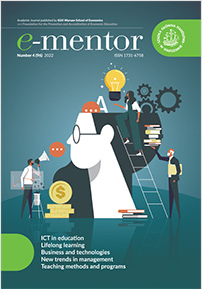Comparison of the effectiveness and efficiency of various forms of distance learning - an experimental study
Comparison of the effectiveness and efficiency of various forms of distance learning - an experimental study
Author(s): Przemysław Kusztelak, Anna PacholakSubject(s): Education
Published by: Szkoła Główna Handlowa w Warszawie, Fundacja Promocji i Akredytacji Kierunków Ekonomicznych
Keywords: distance education; e-learning; online teaching; video lecture; student engagement; effectiveness; experimental study
Summary/Abstract: The aim of this paper is to compare various forms of distance learning in terms of the effectiveness and efficiency of teaching and their subjective evaluation by students. Three forms of remote teaching were analysed for the elective general university course in the winter semester of the 2020/2021 academic year: G1 – with all materials embedded on an e-learning platform for fully asynchronous learning – and with no live meetings, but specially prepared video tutorials replacing them, G2 – with materials embedded on an e-learning platform and lectures conducted synchronously through videoconferences (without video recordings), G3 – with materials embedded on an e-learning platform, synchronous lectures via video conferences and their recordings available afterwards. Final grades, a record of activity at the e-learning platform and the results of questionnaires collected from all participants of the course were taken into account when carrying out the statistical analysis. The analysis proved that the most effective form of learning (the lowest number of hours devoted to learning in order to pass the subject, as well as the percentage of students who completed the course) was the one applied in group G1. According to the opinions of the students, the highest level of satisfaction from the classes was recorded for group G2. The research brings various implications for practice or policy: for teachers interested in improving the effectiveness of their online teaching; for teachers preparing an intervention with the aim of improving students’ remote learning engagement and its quality; supporting teachers’ research engagement in the improvement of educational standards and systems; and learning planners can use these insights helpful in planning online learning projects.
Journal: e-mentor
- Issue Year: 96/2022
- Issue No: 4
- Page Range: 4-13
- Page Count: 10
- Language: English

